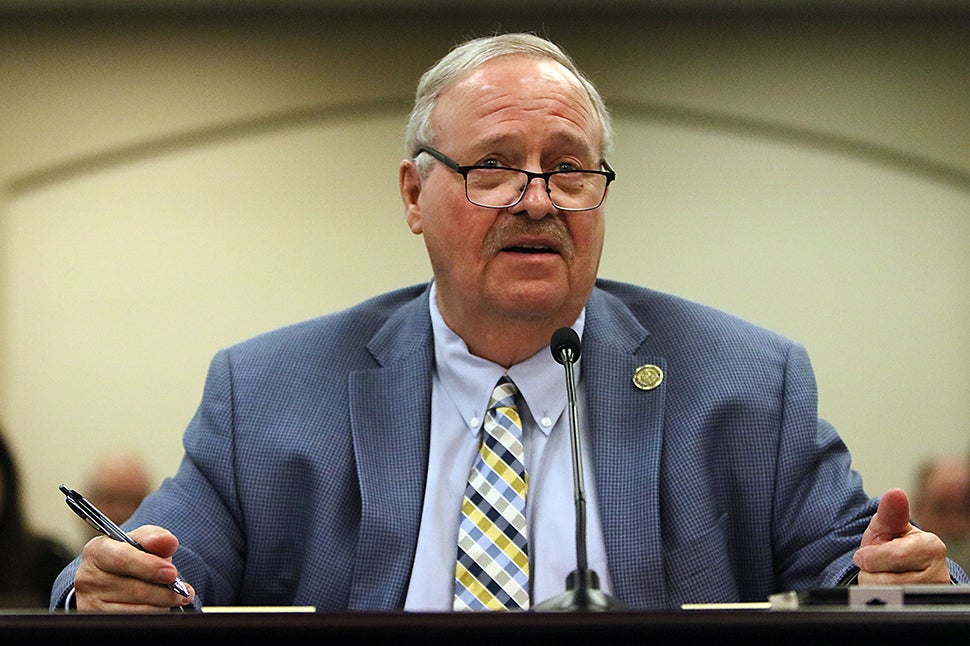‘Very, very dangerous:’ Bill eliminating required lunch and rest breaks, 7-day overtime worker rights moves forward
Published 2:28 am Thursday, February 29, 2024

- FRANKFORT, Feb. 28 – Rep. Phillip Pratt, R-Georgetown, presents House Bill 500, an act related to wages and hours, during the House Committee on Small Business and Information Technology meeting Wednesday. (LRC Public Information)
Wednesday’s House Small Business Committee felt a bit like deja vu.
Less than a week after his bill lowering Kentucky’s child labor restrictions to minimum federal standards passed the House, Rep. Phillip Pratt, R-Georgetown, was back with another bill eliminating certain worker rights.
House Bill 500 aligns the Kentucky Wage and Hour Act with minimum standards in the federal Fair Labor Standards Act.
This means eliminating required lunch breaks, rest periods and overtime pay for seven consecutive days of work, among other provisions.
Pratt said that the intent is the same as his child labor bill—to save Kentucky employers from confusion who must comply with federal and state labor laws. He said that employers often refer to federal laws, and can “easily” run afoul of state law.
Most of the KWHA has been in place since at least 1974.
“Yes, they have been in place for a while but that doesn’t mean that we need to keep those, especially as fast as Kentucky’s growing in some of our job markets,” Pratt said. “We need to make it easier for companies to follow law, not harder.”
What would the bill do?
House Bill 500 would exempt a series of employees from state minimum wage and overtime laws. Kentucky’s minimum wage is $7.25, the minimum federal requirement.
That includes secretaries, domestic service workers in private homes, babysitters, newspaper carriers, some residential care workers, apprentices and workers with disabilities.
Pratt’s bill would also repeal the requirements for employers to give workers “a reasonable period for lunch,” 10-minute rest breaks every four hours and time-and-a-half overtime pay on an employee’s seventh consecutive day of work.
Workers get overtime after exceeding 40 hours regardless, Pratt said, so the seventh day provision is intended for employees who work a few hours each day of the week but don’t meet that threshold.
If an employer doesn’t provide a lunch break, they could not punish employees for eating on the job. However, if there is a lunch break, employers would be able to refuse pay for the time employees are caught eating outside of that break.
Pratt said that this provision is meant to ensure that if Kentucky workers are granted a lunch break, they will be required to be fully relieved from work duties.
The bill also sets the statute of limitations for labor violations at three years. Currently, some violations have a statute of limitations of five years.
Finally, employers would not have to pay workers for time spent traveling to and from their place of employment or time spent on activities before or after their “principal activity or activities.”
This provision arises from a Kentucky Supreme Court case decided last year—Hughes v. UPS Supply Chain Solutions, Inc.
UPS employees argued in a class action suit that the time they spent before clocking in and after clocking out participating in required security screenings should be paid work time.
The Kentucky Supreme Court ruled in UPS’ favor in a 4-3 vote, stating in its opinion that while the legislature had not specified whether preliminary and postliminary activities counted as time on the job, they likely intended it to not count.
Pratt said that some of the justices expressed willingness to reverse their decision if the legislature did not address the issue.
‘Common sense protections:’ Committee discusses bill
House Bill 500 passed the committee in an 8-4-1 vote, with Rep. Susan Witten, R-Louisville, passing due to potential “unintended consequences.”
The committee’s four Democrats voted against the bill, and three Republicans voted yes despite expressing concerns.
Dustin Pugel of KyPolicy called the bill a “sea change to long standing basic rights and dignities on the job.”
“Collectively, these provisions weaken multiple common sense protections for safe working conditions and fair pay that have safeguarded Kentuckians for at least a half a century,” Pugel said. “We as a state put these protections in place for a reason, and those reasons have not changed since then.”
A Kentucky Labor Cabinet representative also testified in opposition to the bill.
Rep. Rachel Roberts, D-Newport, criticized Pratt for waiting for the Labor Cabinet to reach out to him rather than consulting them himself as experts in the policy area.
She also mentioned Pratt’s landscaping business, accusing him of filing this bill for personal gain.
Pratt responded that he would always provide lunch and rest breaks, and that this bill is to help other Kentucky businesses.
Roberts was not deterred.
“What this is doing is asking our constituents to work harder and longer for less pay,” she said.
“That less pay will lead to less payroll taxes. It might lead to more errors in things like really complicated jobs and stressful jobs like social workers and nurses and emergency professionals. I think this is a very, very dangerous piece of legislation.”





